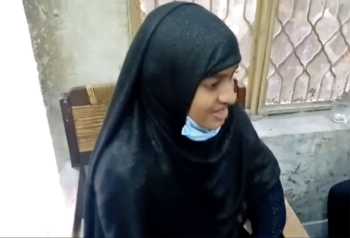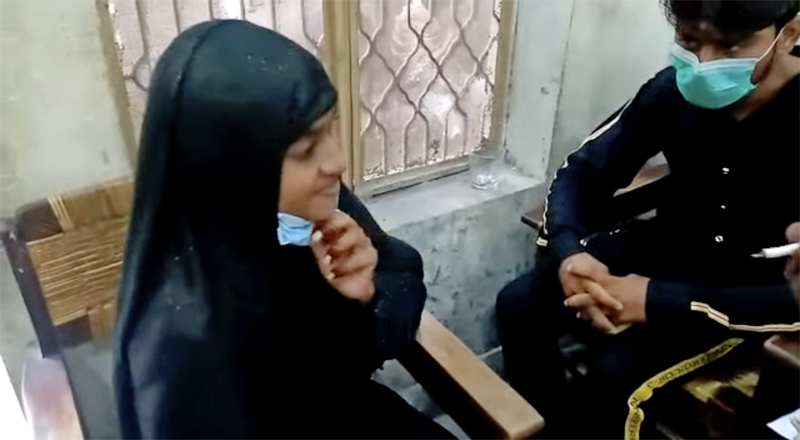When Gulzar Masih’s 14-year-old daughter did not return home from school in Faisalabad,

Pakistan on July 27, the rickshaw driver and his brother set out to find her.
Reaching the school later that afternoon, they found it was locked from the outside. They frantically searched for his daughter, Chashman, on the streets and roads leading to his rented house. They went to the homes of relatives, but she was not there either, he said.
Masih, a Christian, telephoned police and filed a missing persons complaint that night. He made repeated visits to the Samnaabad police station in Faisalabad on July 28, but officials were slow to act on his case, he said.
“After much pleading, our application was converted into an FIR [First Information Report, No. 622/21], but the police remained indifferent to the issue,” Masih told Morning Star News.
They persuaded police to retrieve the call data record of a SIM card in a smart phone his daughter was using for study purposes, he said. The SIM was registered in his wife’s name.
“When the police retrieved the call data, it was revealed that Chashman had received a call from an unknown number on the day she had gone missing,” Masih said. “The investigating officer told us that the phone had been turned off and they couldn’t trace its location.”
The next day they received images on the phone of an Islamic conversion letter, Islamic wedding certificate (Nikahnama) and an affidavit apparently signed by Chashman that she had willfully converted to Islam and married a Muslim named Muhammad Usman. The images were received from the same unknown number noted in Chashman’s call records.
The conversion and marriage was registered by a cleric of an Islamist religio-political outfit, the Pakistan Sunni Tehreek, on July 29 in Sahiwal city, the documents show.

“We requested the police to at least recover Chashman and ask her under what circumstances she had left her home, but they are not listening to us,” Masih told Morning Star News. “They say she has changed her faith and married of her own will, so there’s nothing they can do. But my daughter is only 14 – she’s just a child who made a mistake by falling into the trap of a much older man.”
Masih said the family had yet to approach the courts in order to recover his daughter, a sixth-grade student.
“Honestly speaking, none of us are in the right frame of mind since the day our child was taken from us,” he said. “Chashman’s abduction had numbed my mind so much that I mistakenly stated [to police] that she was 17 years old, even though she had turned 14 just three months ago, on May 13.”
Her birth certificate shows she was born on May 13, 2007.
Child marriages are criminal under Pakistan’s Child Marriage Restraint laws. While Pakistani law recognizes intercourse with a girl below 16 years of age with or without her consent as rape punishable by death, courts have repeatedly held that marriage of an underage Muslim girl cannot be termed invalid because Islamic law holds that a consenting girl who has reached puberty can marry, human rights lawyer say.
Growing List of Cases
Chashman’s abduction adds to the growing list of underage Christian girls who have been forcibly converted and married to their Muslim abductors, particularly in Punjab and Sindh provinces.
On July 1, the Lahore High Court sent Nayab Gill, a 14-year-old Roman Catholic, with her alleged 30-year-old Muslim abductor. Both the trial court and the high court rejected her official birth documents and accepted her verbal claim in court that she’s over 18 years old.
Nayab’s parents have appealed to the Supreme Court of Pakistan with help from the Church of Pakistan for their daughter’s recovery.
The Supreme Court in July rejected an appeal filed by a senior church leader challenging the rejection of his constitutional petition seeking the top court’s intervention in the forcible conversion and underage marriage of Christian girls.
Filed by Church of Pakistan President Azad Marshall, the petition stated that Pakistan accords a degree of permanence to the abduction and forcible conversion of Christian girls by allowing them to marry Muslims without ascertaining the pressures coming to bear on girls when they make declarations of consent before trial and high courts, nor taking into account their intellectual, emotional and social maturity.
It added that such declarations of consent are not investigated to ascertain whether they are voluntary or result from threats, psychological abuse and conditioning and fear of social stigma and rebuke.
A parliamentary panel on minorities earlier this year forwarded key legislation to the government on curbing forced conversions of minority girls, recommending that only adults should be allowed to change religion and only after appearing before a senior district judge.
The government of Prime Minister Imran Khan, however, has strongly opposed the legislation. Federal Minister for Religious Affairs Pir Noorul Haq Qadri has categorically stated that the government is opposed to a restriction on religious conversion before the age of 18 years.
“If someone aged 14 years wishes to convert to some other religion, they could not be stopped,” the minister commented during a meeting of the Senate parliamentary committee on minorities’ rights on July 14, the same day the Supreme Court rejected Bishop Marshall’s appeal.
Qadri added that if someone wished to change their religion before reaching age 18, it was their choice, and that “a Nikah [Islamic marriage] or marriage before 18 was another discussion.”
Pakistan leads the world in forced marriages, with about 1,000 Christians married against their will to Muslims from November 2019 to October 2020, according to Christian support organization Open Doors’ 2021 World Watch List report. In terms of abductions, the report listed Pakistan as fourth with an estimated 100 kidnappings.
The U.S. State Department in December re-designated Pakistan among nine other “Countries of Particular Concern” for severe violations of religious freedom. Previously Pakistan had been added to the list on Nov. 28, 2018.
Pakistan ranked fifth on Christian support organization Open Doors 2021 World Watch list of the 50 countries where it is most difficult to be a Christian.
If you would like to help persecuted Christians, visit http://morningstarnews.org/resources/aid-agencies/ for a list of organizations that can orient you on how to get involved.
If you or your organization would like to help enable Morning Star News to continue raising awareness of persecuted Christians worldwide with original-content reporting, please consider collaborating at https://morningstarnews.org/donate/



